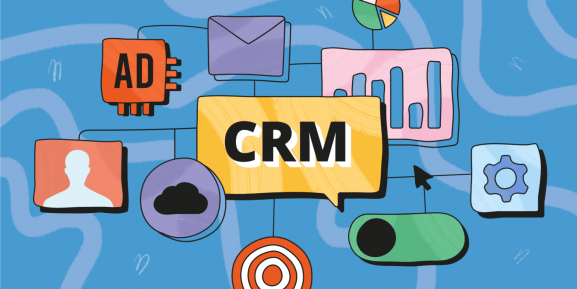CRM systems are customer relationship management software that gathers all customer information from interactions and provides a centralized dashboard for all customer-facing teams. This gives insights that help deliver highly personalized interactions.
Cloud-based CRMs are software hosted on the cloud and are provided software as a service (Saas) by vendors. Being on the cloud means customer data is stored on shared databases accessible over the internet. This divides the architecture cost among users, making it a cost-effective CRM solution.
Cloud-based CRM benefits by giving Instant access to the CRM, allowing you to get real-time insights, automate critical processes, and provide better customer service.
While traditional on-premise CRM solutions require a significant upfront investment in hardware, software, and IT maintenance, cloud-based CRM systems offer a more cost-effective and agile alternative.
By leveraging the cloud, businesses gain enhanced accessibility across devices, streamlined implementation and deployment, and seamless integration with other business tools. Cloud CRM promotes improved team collaboration, scalability to support business growth, and reduced IT maintenance overhead.
Key Differences Between Cloud and On-Premises CRMs
Storage
For the on-premise CRM, data storage is done on the architecture present on the premises and managed by the IT department. In Cloud CRM, the data is stored on a central cloud available to all users. Businesses don’t have to worry about maintenance or upgrade.
Ease of access
Since the data is stored in the cloud, the cloud-based CRM allows you to access it anytime, anywhere. The traditional CRM lacks the easy access feature. You have to be on-premise to get connected with it.
Costs
Cloud CRM stores data on the cloud, and the costs are affordable. As your storage needs increase or decrease, it is very easy for you to upgrade or degrade your storage requirements. Its costs will fluctuate depending on your storage needs. On the other hand, on-premise CRM involves significant upfront investments in hardware and ongoing maintenance expenses.
Integration
Integration on-premise CRM is supposed to be based on the application requirement; for the cloud, adding other applications to your central CRM system is much faster.
Advantages of Cloud CRM
1. Streamlined Implementation and Deployment
Cloud-based CRMs eliminate the complexities associated with on-premise installations. Traditionally, in the case of on-premise CRM applications, the IT teams needed to build complete data storage architectures, and any updates or maintenance of the CRM application would lead to downtime. Meanwhile, deployment in cloud-based CRM is significantly faster, minimizing disruptions to your business operations.
2. Enhanced Accessibility Across Devices
With cloud-based remote access CRM, your team can access customer data and perform essential tasks while on the internet. Remote access is indispensable when working with global and on-the-field teams. Moreover, some CRMs allow offline record viewing and updates, making it a great cloud-based CRM benefit.
3. Seamless Integration with Existing Tools
Integration with other applications becomes seamless with other essential business tools. This bridges the gap between various systems and enables smooth data exchange and uninterrupted workflow. These can be applications like email marketing, accounting collaboration, and more.
4. Improved Collaboration Among Teams
The best part of having a cloud CRM is that it always shows real-time updates of your business. Your teams with a centralized database foster better collaboration, reduce data silos, and enhance overall team productivity. With a centralized system, requests seamlessly flow from and to among departments, always keeping the teams on track.
5. Scalability to Support Business Growth
Scalable CRM Systems allow you to adjust your subscription plan to accommodate increased data storage, user accounts, and advanced functionalities. As your business grows, it becomes a dire need to expand all your systems. It should be a seamless process as you don’t want it to become another task figuring out what new software to shift your whole team onto.
6. Cost Savings and Reduced IT Maintenance
You’ll save many costs with Cloud CRM Solutions, as they typically operate on a subscription model. This eliminates the need for significant upfront investments in software licenses and hardware. Additionally, cloud CRM providers handle most IT maintenance and support, reducing your internal IT burden.
7. Security And Flexibility
Data security is of prime importance when saving sensitive customer information. Leading cloud CRM providers employ vigorous security measures like data encryption, firewalls, access controls, and safeguarding data against data breaches. This protects customer information from unauthorized access and breaches.
8. Customization
Cloud-based CRMs offer a high degree of customization. Since every business is unique and has specific requirements, cloud CRM complements it by going beyond just the flexibility of adding data fields. You can create custom workflows that can be automated and even work with integrated third-party applications.
9. Automation and AI
Many advanced cloud CRMs incorporate AI-powered generative and predictive capabilities. This enables the CRM to utilize customer data to generate customer interaction history, smart replies, and personalized emails. Furthermore, it analyzes sales history to recommend upselling and cross-selling opportunities. These features can significantly improve sales efficiency and enhance customer interactions.
Moreover, AI can automate workflows. For instance, whenever a customer orders from your website, you can use AI to generate an order confirmation email and send it to the customer. This will profoundly speed up the process and reduce manual workload.
10. Enhanced Sales Visibility And Performance Tracking
Cloud CRM tracks every conversation with the lead, enabling you to track key metrics and identify areas for improvement. With a clear view to visualize the customer journey, executives know their sales pipeline health at a glance and mold their strategies based on AI sales projections.
With AI enhancement, you can get recommendations on the best next steps to move the customer ahead in the journey.
Best Cloud CRM Solutions
Salesforce
Salesforce is one of the most prominent players when it comes to cloud-based CRM. It is apt for any size of business looking to have a CRM that is easy to use and robust with its advanced features. It further offers AI predictive and generative capabilities to create smart replies, emails, campaigns, and more.
Its top features include:
- Detailed data analytics
- Predictive capabilities
- Comprehensive reporting
- Opportunity management
- Lead scoring
- Activity dashboard
SuiteCRM
SuiteCRM is one of the cost-effective CRM solutions, apt for small to medium businesses looking for a CRM with all the advanced capabilities in a budget. It is open-source and can be downloaded and customized according to business requirements. SuiteCRM offers cloud hosting at various subscription packages.
Its features include
- Dashboards
- Reporting
- Lead capturing
- Creating personalized quotations
- Automation
Conclusion
Cloud CRM Solutions have made Customer Relationship Management a more streamlined and cost-effective way for businesses to manage customer relationships. By offering enhanced accessibility, streamlined implementation, Business Process Automation, and cost-effectiveness, cloud CRM empowers enterprises to enhance customer experiences and improves sales, driving significant business growth.
As technology evolves, cloud CRM solutions will become even more powerful and complex, incorporating advanced AI and machine learning capabilities. To make the most of CRMs, companies need to partner with CRM experts like RT Dynamic. We are a team of CRM experts who can assist you with data migration, implementation, customization, integrations, and more. Contact us today, and let’s take advantage of Cloud CRM.



